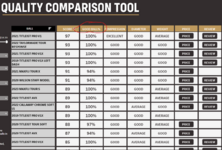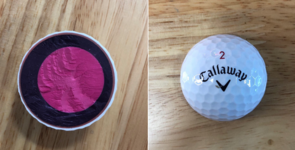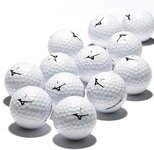We've launched the new forums! Read more here
Navigation
Install the app
How to install the app on iOS
Follow along with the video below to see how to install our site as a web app on your home screen.

Note: This feature currently requires accessing the site using the built-in Safari browser.
More options
You are using an out of date browser. It may not display this or other websites correctly.
You should upgrade or use an alternative browser.
You should upgrade or use an alternative browser.
How consistent are your golf balls?
You are using an out of date browser. It may not display this or other websites correctly.
You should upgrade or use an alternative browser.
You should upgrade or use an alternative browser.
when my golf balls smile back at me, that's when trust is earned...

My golf ball is way more consistent than my golf swing. So yeah, not at all worried about it.
Other than the Bridgestone testing years ago at my home course, I have never tested or been fit for golf balls and as far as I recall. I am guessing that the closest place to me to test would be 2 hours away.
I do play premium balls, Titleist, Callaway, Bridgestone and happy with their performance. I rarely purchase new golf balls as I have an abundance of supply provided at my home course. If I do come across what I consider a “dud” it will be taken out of play permanently and replaced although that is rare.
I honestly have more issues with the inconsistency of my swing than the balls themselves. When the swing gets grooved, I typically will ride out one particular golf ball but overall I find they all go relatively the same distance, etc but don’t blame the ball on causing me to hit in thin.
I do play premium balls, Titleist, Callaway, Bridgestone and happy with their performance. I rarely purchase new golf balls as I have an abundance of supply provided at my home course. If I do come across what I consider a “dud” it will be taken out of play permanently and replaced although that is rare.
I honestly have more issues with the inconsistency of my swing than the balls themselves. When the swing gets grooved, I typically will ride out one particular golf ball but overall I find they all go relatively the same distance, etc but don’t blame the ball on causing me to hit in thin.
Et Tu Brute?
Well-known member
Yeah, that's a durable meme around here going back years. Titleist is generally the most expensive ball and then the other majors price themselves the same or just a tiny bit less than Titleist. Right now Titleist is at $55, Callaway and Taylormade the same $55, while Bridgestone and Srixon are "bargains????" at $50. Even Wilson is at $50 now.I meant price.
Yet from the way people talk about ball prices, you'd think Titleist were charging 50, 60, 70 percent more than their competition or something. As it is, was and ever shall be.
"Crude checks" ?Over the long history of golf, there have definitely been periods when Titleist did better than "the rest" on quality and consistency. I think at the current time that may not be the case.
After a lot of bad publicity, Callaway in particular had to tighten up their Q/C. The kind of crude checks that MGS, for instance, does certainly don't guarantee consistent performance. But some of the stuff Callaway was shipping out several years ago was so awful there's no way it could possibly be consistent.
Remember that over half a century ago Titleist achieved its premium reputation by doing 100% manual inspection via X-Rays of their wound balls when nobody else in the industry could be arsed to even worry about it. Of course X-Rays or not, the balls people were happy to play in the mid-20th were absolute crap from a Q/C an consistency perspective. A sleeve of the cheapest urethane balls out of the lowliest factory in Asia nobody has ever heard of is going to be orders of magnitude more consistent than any Balata balls could have been back in the day.
How exactly are they crude? As far as I know they are the only group that actually runs balls through a set testing standard that measures weight, concentricity, size, and compression as well as measurements in the different layers, while also looking for any defects on the surface or anomalies in the interior.
I trust that kind of "crude" testing before a magazine or website that pushes a brand of ball simply because they advertise or sponsor a tournament with them.
Last edited:
Careful, you'll get some serious hate for posting MGS stuff here.Most top brands are incredibly consistent. Titleist is best at QC year after year in MYGOLFSPY ball tests.
View attachment 9260668
Wasn't true a few years ago when Callaway was producing this....
View attachment 9260667
- Thread starter
- #60
I don't think it's necessary to take this down that road fellas.
mostly, yea. I try to always use the same ball
The day I start worrying about how consistent my ProV1's are is the day I turn pro. And at 71 I really don't see that happening.
I trust most major brands to put out quality balls that are more consistent than my golf ability so I have no real concerns here.
Many of the commenters say how they are not good enough to worry about their balls consistency. I get it, as one of the worst ball strikers I know it can be hard to rationalize how a inconsistent ball might affect you but hear me out.
If you are playing a ball that is not consistent it can hurt you game. A ball that has a huge compression variance for instance can dramatically affect distance on an approach shot. The ball you were playing on the first nine that carried 145 off your eight iron, yet the new ball you put in play after slicing one into no man's land on 10 only went 135 on the par three 15th when anything short goes into the creek. How about a ball that has a large weight discrepancy? In testing that I see there are many "premium" balls that have significant measurable deltas in weight, size, and compression. That ball that has a little cover defect can make a 10 yard fade into a 20 yard slice that might be the difference in a ball in play or hitting 3 off the tee. The ball that has a chunk of regrind material in the core material can affect the ballance enough to make that par putt on 18 worth 5 carry over skins just track a 1/2 off line and cause a miss that wasn't your fault.
Ball consistency and quality matter.
There isn't a single manufacturer that isn't pushing the line that they have great quality control. But the testing and data shows that to be false.
If you are playing a ball that is not consistent it can hurt you game. A ball that has a huge compression variance for instance can dramatically affect distance on an approach shot. The ball you were playing on the first nine that carried 145 off your eight iron, yet the new ball you put in play after slicing one into no man's land on 10 only went 135 on the par three 15th when anything short goes into the creek. How about a ball that has a large weight discrepancy? In testing that I see there are many "premium" balls that have significant measurable deltas in weight, size, and compression. That ball that has a little cover defect can make a 10 yard fade into a 20 yard slice that might be the difference in a ball in play or hitting 3 off the tee. The ball that has a chunk of regrind material in the core material can affect the ballance enough to make that par putt on 18 worth 5 carry over skins just track a 1/2 off line and cause a miss that wasn't your fault.
Ball consistency and quality matter.
There isn't a single manufacturer that isn't pushing the line that they have great quality control. But the testing and data shows that to be false.
Last edited:
- Joined
- Feb 10, 2012
- Messages
- 54,321
- Reaction score
- 19,755
- Location
- South Georgia
- Handicap
- Cold Temps
As long as it consistently reacts the way I think it should when hit into the green via full swing, pitch or chip shot, I am good with it. No access to any fancy launch monitors to give me data. Just trust my eyes.
CorvetteGuy
Well-known member
- Joined
- Sep 23, 2020
- Messages
- 1,317
- Reaction score
- 1,473
- Location
- Great PNW - Seattle Area
- Handicap
- GHIN 7.6
I have a crude system.. if I hit the ball of the tee and it goes the distance I felt it should go - it stays -- if it comes up short - it is thrown in the crap ball bucket.
I'm thinking Check-n-Go.. You should see how some balls(2-piece), just bounce around in that little cage when you start to spin them. Once they settle down, I give it a minute, or so, then use a thin marker to mark the equator while spinning. Most never line up with the "alignment" marks already on the ball. I feel this gives me a better chance that the ball is "balanced", either off the tee, or putting. "Could" make a difference between hitting the fairway, or in the rough, dependent on your swing. Not a scientific observation, but a personal one. Swing tendencies are the biggest factor in ball flight. Even if this is a mental thing, say that, I feel better about my ball, having used the Check-n-Go, boosting my overall confidence, which is a good thing. Having confidence in your equipment is paramount for your game, knowing that you can perform well, with one less thing to think about...
To the original question, How consistent are your golf balls? My honest answer is I don’t know. I typically play a 2 piece low compression ball made for distance when I buy new. Currently I’m playing E12 Contacts and SuperSofts. They seem to do everything I need them to do and are consistent enough for me.
I also play AVX’s and CS TruVis but typically will buy them used because I can loose them at a cyclic rate at times. Who knows how long they’ve been sitting in the water or in the woods before they get cleaned up. If I see an off shot with those 99/100 I assume it’s a me thing and not a ball issue.
The big thing for me is who makes it. Is it a made for or is it made by the person selling it. I try and buy the ones that actually make it.
I also play AVX’s and CS TruVis but typically will buy them used because I can loose them at a cyclic rate at times. Who knows how long they’ve been sitting in the water or in the woods before they get cleaned up. If I see an off shot with those 99/100 I assume it’s a me thing and not a ball issue.
The big thing for me is who makes it. Is it a made for or is it made by the person selling it. I try and buy the ones that actually make it.
I guess if we go to a two piece ball, then they'll be more consistent. Fewer things to go wrong in manufacturing.
I play most of the main players in the golf ball world, and I have never hit a shot and thought “huh, that ball was weird”, so I guess I just trust them that they are all decently consistent.
Only time that might happen it would typically be because of elements like wind or mud, but not from the ball itself.
Only time that might happen it would typically be because of elements like wind or mud, but not from the ball itself.
My Game will have to be consistent before I can blame it on the Ball, so I have no idea.
Et Tu Brute?
Well-known member
As fun as it is to speculate here, the fact is it's extremely impractical to get any sort of sensible estimate of "how consistent" mass produced golf balls are. People like MGS can flag the "obviously inconsistent" situations like they did with Callaway a few years back or what they find from time to time with DTC balls. So yeah, we can eliminate some models because they're so bad even a sample of 3doz shows obvious Q/C defects.
But the vast majority of name-brand balls that aren't complete Q/C fails, it's really only the manufacturer's in-house testing that is going to have any real insight into the difference between, say, being so consistent even a robot or a Tour player can't see any differences versus merely of consistent weight, roundness and without obvious core defects.
For my part, I just stick to balls from either established mainstream brands or DTC outfits like Snell, et al.. who at least design and test their own balls. Then I avoid the ones that MGS or anyone else has shown to suffer from frequent and obvious defects. I'm fine with knowing only that the balls I'm using are likely to be properly manufactured without knowing if some alternative ball might be another sigma closer to perfectly consistent performance.
But the vast majority of name-brand balls that aren't complete Q/C fails, it's really only the manufacturer's in-house testing that is going to have any real insight into the difference between, say, being so consistent even a robot or a Tour player can't see any differences versus merely of consistent weight, roundness and without obvious core defects.
For my part, I just stick to balls from either established mainstream brands or DTC outfits like Snell, et al.. who at least design and test their own balls. Then I avoid the ones that MGS or anyone else has shown to suffer from frequent and obvious defects. I'm fine with knowing only that the balls I'm using are likely to be properly manufactured without knowing if some alternative ball might be another sigma closer to perfectly consistent performance.


















